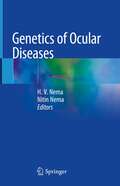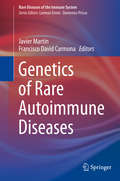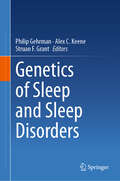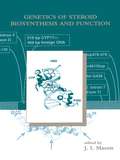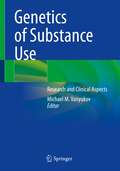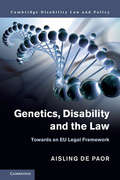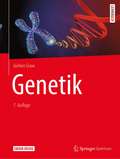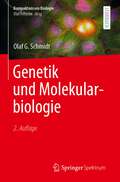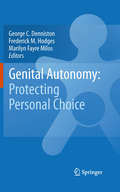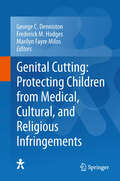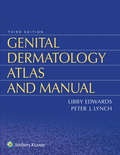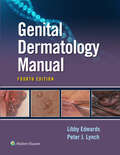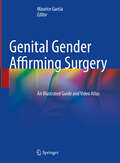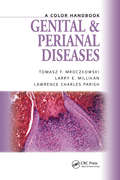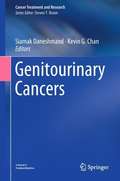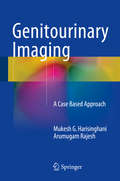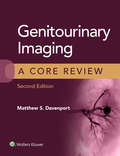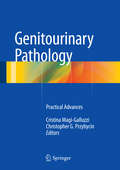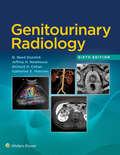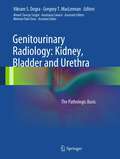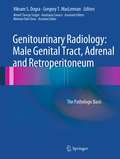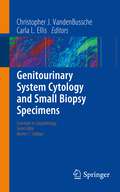- Table View
- List View
Genetics of Mental Disorders: What Practitioners and Students Need to Know
by Stephen V. Faraone Ming T. Tsuang Debby W. TangIntroduces ideas about inherited genetically based mental disorders and how they combine with environmental factors. thinks about mental disorders with insight.
Genetics of Ocular Diseases
by H. V. Nema Nitin NemaThe book focuses on describing the importance of genetics in eye diseases in a comprehensive and concise manner. Mutations in different set of genes have been detected and incriminated in complex mechanisms of causing leading eye diseases such as cataract and glaucoma. This book written by well-established ophthalmologists and geneticists presents a complicated subject in simple and easy to understand manner. Chapters cover the concept of gene therapy which is an emerging subject with high potential. The book includes a separate chapter on genetic counseling, which has become an integral component of ophthalmology. The book will assist the practicing ophthalmologists in early diagnosis of genetic eye diseases as well as help the geneticists in understaning the basic concepts. It will also be useful for students who are preparing for MD, MS, DNB and FRCS examinations.
Genetics of Rare Autoimmune Diseases (Rare Diseases of the Immune System)
by Javier Martín Francisco David CarmonaThe main aim of this volume is to provide an updated overview of the genetic basis of a group of complex disorders that are considered rare individually, but show a relatively high prevalence on the whole in developed countries: the rare autoimmune diseases. These are chronic disorders that involve long and expensive treatments with considerable side effects that may dramatically reduce the quality of life of affected people. Therefore, shedding light into their pathologic mechanisms is a major concern given their growing social and economic awareness and impact. General sections include different chapters on single entities as systemic lupus and sclerosis, Behçet’s disease, Sjogren’s syndrome and polymiositis, and sections devoted to autoimmune vasculitis, hepatic autoimmune conditions, as well as those affecting the nervous system, and a concluding chapter in which the shared predisposition amongst all diseases is discussed. All the chapters are given a homogeneous scheme in which the authors explain the clinical singularities of every disease and report the recent breakthrough discoveries related to them, giving a critical interpretation and suggesting future perspectives. All contributors are renowned researchers with high expertise in each disease. Due to the exponential increase in our understanding of the genetic causes of these complex diseases, a major advance in biomedical discovery is taking place. However, most of the achievements in this field are very recent and there is a lack of bibliography gathering them together. This book is thus filling a gap and will prove a useful companion to clinicians in the first place (internists, rheumatologists, clinical immunologists, and hematologists) but also to basic and applied researchers.
Genetics of Sleep and Sleep Disorders
by Philip Gehrman Alex C. Keene Struan F. GrantThis book focuses on the latest research on the genetic basis of the regulation of sleep and wakefulness and of sleep and circadian rhythm disorders, which has been expanding rapidly due to advances in genetics. The book reviews the latest genetic discoveries in animals and humans and explores their implications for getting a good night's sleep. Philp Gehrman, Alex Keene, Struan Grant, and a cadre of top sleep researchers and clinicians explore the genetics of sleep and sleep disorders in depth. The book should appeal to sleep medicine specialists, psychiatrists, geneticists, and neuroscientists.
Genetics of Steroid Biosynthesis and Function (Modern Genetics Ser.)
by J. I. MasonSteroids are among the most widely prescribed drugs for humans, and steroid signaling pathways are present in vertebrates, plants, insects and fungi, presenting new avenues for biotechnological intervention. Genetics of Steroid Biosynthesis and Function focuses on the genetic and cellular aspects of mammalian steroid hormones with particular attent
Genetics of Substance Use: Research and Clinical Aspects
by Michael M. VanyukovThe book illuminates the complex problems in genetic studies of substance use and addiction. It provides a comprehensive overview that fills the gap in the literature and points out future directions.The book includes three sections that apply to any complex traits and disorders, particularly psychological and psychiatric. The first section covers the traits and phenotypes that are the target of genetic research in substance use and addiction. Following this, the second section analyzes the methods and results of biometric genetic studies in this area. The third section reviews research in gene mapping and epigenetics. Genetics of Substance Use is a first-of-its-kind monograph that presents contemporary solutions and methods for a wide range of researchers and practitioners across disciplines.
Genetics, Disability and the Law: Towards an EU Legal Framework (Cambridge Disability Law and Policy Series)
by Aisling De PaorWhile advances in science and technology bring many advantages, we must not ignore the harm that they can cause. Rapid changes in genetic testing are a prime example, and indicators can now help to detect, address and treat diseases. However, in this new study, Aisling de Paor examines how genetic testing is also being used for non-medical reasons, for example for work opportunities and insurance coverage. Genetics, Disability and the Law is the first book of its kind to substantively consider an EU-level response to the use of genetic information. de Paor discusses how to help genetic and scientific research to evolve and grow, how to enhance public confidence in research, and how to control it so that it recognises our values and fundamental human rights. An understudied but vitally important topic, de Paor's work provides a valuable and timely contribution to the field of disability rights. Presents a practical consideration of an EU-level legislative response to controlling the use and misuse of genetic information, appealing to those involved in the regulation of this field Takes a human rights and disability approach to considering the regulation of genetic information, which will interest scholars and policymakers from a variety of disciplines, in particular because it considers the intersection of disability and genetics Considers normative and non-normative attitudes to the regulation of genetic information, giving readers a new and varied insight
Genetics: Analysis and Principles
by Robert J. BrookerGenetics: Analysis and Principles is a one-semester, introductory genetics textbook that takes an experimental approach to understanding genetics. By weaving one or two experiments into the narrative of each chapter, students can simultaneously explore the scientific method and understand the genetic principles that have been learned from these experiments. The pedagogy of Genetics: Analysis & Principles has been designed to foster student learning. Instead of being a collection of facts and figures,this text is intended to be an engaging and motivating textbook in which formative assessment allows students to move ahead and learn the material in a productive way.
Genetik
by Jochen GrawVon Mendel bis zu Genomforschung und Gentechnologie reicht dieses Standardwerk der Genetik. Es ist klar strukturiert und bietet eine umfassende Darstellung der klassischen und der molekularen Genetik. Cytogenetik, Entwicklungsgenetik, Humangenetik und Anthropologie sowie Neuro- und Verhaltensgenetik sind weitere wichtige Inhalte. Komplexe Sachverhalte werden verständlich und auf dem aktuellen wissenschaftlichen Stand dargestellt. Technikboxen bereichern das umfassende Themen- und Methodenspektrum. Dieses Buch vermittelt genetisches Grundlagenwissen für das gesamte Studium. Dabei unterstützen zahlreiche hervorgehobene Lernhilfen und Beispiele aus allen Bereichen der Genetik, ansprechende, farbige Abbildungen sowie Übungsfragen. Die 7. Auflage wurde gründlich überarbeitet und aktualisiert sowie mit Links zu erklärenden Videos zu besonderen Aspekten des jeweiligen Kapitels ergänzt.
Genetik und Molekularbiologie (Kompaktwissen Biologie)
by Olaf G. SchmidtDer Espresso unter den LehrbüchernKompaktwissen Genetik und Molekularbiologie präsentiert die Inhalte in klarer, prägnanter Darstellung. Ohne unnötigen Ballast und im richtigen Kontext erläutert der Band verständlich die Fakten, Zusammenhänge und Prinzipien dieses wichtigen Teilgebiets der Lebenswissenschaften. Damit eignet er sich besonders… zur Nachbereitung von Vorlesungen und Seminaren … zur Vorbereitung auf Prüfungen… zum Nachschlagen während des späteren Studiums oder im Berufsleben. Das Wichtigste zur Genetik und ihrer Molekularbiologie von Pro- und Eukaryoten Das gesamte Wissen zur Genetik für die Prüfungen bis zum Bachelor oder ersten Staatsexamen in kompakter Form:Das genetische MaterialOrganisation des ErbgutsDNA-ReplikationTranskription und Translation bei Bakterien, Archaeen und EukaryotenRegulation der Genexpression bei ProkaryotenRegulation der Genexpression bei EukaryotenFormale Genetik, Klassische GenetikRekombination, VariabilitätKonjugation, Transduktion, Transformation bei BakterienMutationenDNA-ReparaturmechanismenHumangenetikImmun- und EntwicklungsgenetikGenomikMethoden: von DNA-Isolierung bis Genome Editing und Organ-ChipsModellorganismenDie zweite Auflage wurde durchgehend überarbeitet und um aktuelle Inhalte ergänzt. Erweitert wurden vor allem die Darstellungen zur Architektur des Genoms, seiner Kontrolle und Regulation und die Bedeutung epigenetischer Vorgänge.
Geneva: A Novel
by Richard ArmitageA bold and unpredictable debut thriller set in the biotech world (and deceptive beauty) of Switzerland, by acclaimed actor Richard Armitage.Nobel Prize-winning scientist Sarah Collier has taken a step back from work to spend more time with her family. Movie nights with her husband Daniel and their daughter Maddie are a welcome respite from the scrutiny of the world&’s press. As much as it hurts, it&’s good to be able to see her father more too. He&’s suffering from Alzheimer&’s and needs special care. Sarah has started to show tell-tale signs of the disease too. She&’s been experiencing blackouts and memory loss. It&’s early days but she must face the possibility that she won&’t be there to see her daughter grow up. Daniel, a neuroscientist himself, is doing his best to be supportive but she already knows that she will have to be the strong one. For all of them. So when Sarah is invited to be the guest of honour at a prestigious biotech conference in Geneva she declines, wanting to stay out of the public eye—that is until Daniel shows her the kind of work that the enigmatic Mauritz Schiller has been developing. Flown first class to the spectacular alpine city and housed in a luxury hotel, Sarah and Daniel are thrust back into the spotlight. As they try to shut out the noise of the public media storm, in private Sarah is struggling with her escalating symptoms. And the true extent of what Schiller has achieved is a revelation. This is technology that could change medicine forever. More than that, it could save Sarah&’s life. But technology so valuable attracts all kinds of interest. Wealthy investors are circling, controversial blogger Terri Landau is all over the story, and someone close to Schiller seems bent on taking advantage of the situation for themselves. Sarah feels threatened and does not know who to trust—including herself. Far from being her lifeline Schiller's technology may be her undoing. As events spiral out of control, Sarah and Daniel are faced with the ultimate question: how far would you go for someone you love?
Genital Autonomy:
by Frederick M. Hodges Marilyn Fayre Milos George C. DennistonCircumcision affects 15.3 million children and young adults annually. In terms of gender, 13.3 million boys and 2 million girls are subjected to the involuntary removal of part or all of their external sexual organs every year. The problem of female circumcision has been addressed on an international level, but male circumcision remains a controversial subject that many academics have been reluctant to examine. Circumcision is tolerated today because it has been practiced for millennia by a small but vocal minority of religious and ethnic groups, however, when the practice is examined through the lens of modern legal, ethical, and human rights advancements, no place remains in civilized society for this body-altering ritual. In Genital Autonomy: Protecting Personal Choice, international experts address various types of genital modifications, the impact of these harmful traditional practices on the child, on human rights, and on the development of the concept of bodily integrity. The papers presented in this volume address these topics from a variety of angles. They question and dissects the true motivations of the doctors, witch doctors, and "holy men" who promote and profit from circumcision.
Genital Cutting: Protecting Children from Medical, Cultural, and Religious Infringements
by Frederick M. Hodges Marilyn Fayre Milos George C. DennistonThis volume contains the proceedings of the 10th International Symposium on Circumcision, Genital Integrity, and Human Rights. Authors are international experts in their fields, and the book contains the most up-to-date information on the issue of genital cutting of infants and children from medical, legal, bioethical, and human rights perspectives.
Genital Dermatology Atlas and Manual
by Peter Lynch Libby EdwardsSubstantially revised and updated, this practical, lavishly illustrated atlas now makes it easier than ever for clinicians at all levels of experience to arrive at an accurate diagnosis for both common and rare genital dermatologic lesions. Genital Dermatology Atlas and Manual, Third Edition, features almost 500 new photographs, an easy-to-use diagnostic approach, and expanded sections on clinical descriptions, pathophysiology, and treatment. Illustrations are arranged by appearance for rapid identification – even for conditions never previously encountered.
Genital Dermatology Manual
by Libby Edwards Peter J. LynchPractical and highly illustrated, Genital Dermatology Manual, 4th Edition, by Drs. Libby Edwards and Peter J. Lynch, helps clinicians at all levels of experience arrive at an accurate diagnosis for both common and rare genital dermatologic lesions. More than 500 full-color photographs are arranged by appearance for rapid identification, offering superb visual guidance even for conditions not previously encountered. This easy-to-use reference is ideal for any clinician who sees men and women with disorders of the external genitalia, including dermatologists, gynecologists, urologists, primary care physicians, nurse practitioners, nurse midwives, and physician assistants.
Genital Gender Affirming Surgery: An Illustrated Guide and Video Atlas
by Maurice GarciaThis book is structured to enhance the techniques of reconstructive surgeons of multiple different specialties who seek to develop a program in Genital Gender Affirming Surgery (gGAS). It also furthers the understanding and development of quality of life issues such as reproductive and sexual health. At the present time, there is no consensus regarding correct surgical technique for these procedures. Different approaches are made by different surgeons with differing specialties of surgery. This book fills a gap in identifying experienced surgeons and clinicians who share their knowledge of comparative anatomy and surgical technique with surgeons of other disciplines. The unique nature of this text will allow the surgeon to understand each step of these complex genital operations in both schematic detail and in real time. Additionally, this text will focus on up-to-date important factors in allied care to surgery. This will include preoperative, post-operative care, and other very important quality of life issues such as fertility preservation, sexuality, and psychological management.
Genital and Perianal Diseases: A Color Handbook (Medical Color Handbook Ser.)
by Tomasz F. Mroczkowski Larry E. Millikan Lawrence Charles Parish MDHighly Commended, BMA Medical Book Awards 2014Despite the development of penicillin and other treatments, the incidence of sexually transmitted diseases (STDs) worldwide continues to rise. In Genital and Perianal Diseases, A Colour Handbook, the authors discuss the diagnosis and treatment of the main cutaneous conditions of the anogenital region, w
Genitourinary Cancers (Cancer Treatment and Research #175)
by Siamak Daneshmand Kevin G. ChanThis book addresses the most pressing current questions in the management of urologic malignancies. The rapid advances in imaging and molecular markers are placed into a clinical context, with explanation of their effects on prognosis and treatment planning. Similarly, progress in immunotherapy is carefully examined, focusing in particular on the role of immune checkpoint inhibitors in both early- and late-stage urologic malignancies. Looking beyond the improvements in minimally invasive techniques for urologic cancers, the impacts of care coordination pathways and enhanced recovery after surgery protocols are reviewed. Readers will also find enlightening discussion of the decision algorithm for the treatment of early-stage, high-grade bladder cancer, taking into account evidence on the most advanced treatment options and the circumstances in which surgery may need to be expedited. The penultimate chapter discusses the Cancer Genome Atlas project for bladder cancer, and the book closes by considering contemporary medical and surgical management of testicular cancer.
Genitourinary Imaging
by Mukesh G. Harisinghani Arumugam RajeshGenitourinary Imaging - A Case Based Approach is a user friendly, portable guide that offers a comprehensive coverage of the subspecialty with an emphasis on all modalities. As subspecialty practice has become the norm in radiology, it becomes increasingly important to keep abreast of the latest information within the specialty that one is practising. The case based nature of this book, with modality independent content, allows the reader to assimilate practice specific information with ease. Full color images with tabular salient points, imaging algorithms and evidence based criterion support the text. Key points provide succinct explanations of the disease and an appropriate differential diagnosis, as well as providing a brief description of therapy and prognosis. Genitourinary Imaging - A Case Based Approach is aimed at residents and training and practicing genitourinary radiologists.
Genitourinary Imaging: A Core Review
by Matthew S. DavenportPrepare for success on the genitourinary imaging component of the radiology Core Exam! Genitourinary Imaging: A Core Review, Second Edition, is an up-to-date, practical review tool written specifically for the Core Exam. This helpful resource contains 300 image-rich, multiple-choice questions with detailed explanations of right and wrong answers, fully revised content, excellent image quality, high-yield tables for easy review, and additional eBook questions to ensure you’re ready for the Core Exam and maintenance of certification.
Genitourinary Pathology
by Cristina Magi-Galluzzi Christopher G. PrzybycinThis book provides a comprehensive, state-of-the art review of the genitourinary tumor pathology field and the most contemporary insights regarding specimen submission, histologic morphology, immunohistochemistry, and molecular studies useful in the diagnosis of genitourinary neoplasms. Discussion of the clinical implications of pathological findings is contributed by renowned clinicians in the field. This handsome volume guides the reader through the intricacies of genitourinary tumor pathology, diagnosis, reporting, and prognosis. Written by experts in the field, Genitourinary Pathology: Practical Advances is of great value to anatomic pathologists, urologists, fellows in genitourinary pathology, as well as upper level residents training in pathology.
Genitourinary Radiology
by N. Reed Dunnick Jeffrey H. Newhouse Richard H. Cohan Katherine E. MaturenPreviously known as the Textbook of Uroradiology, the newly retitled Genitourinary Radiology continues to bring you top-flight expertise in interpreting imaging studies of the genitourinary tract. A team of leading authorities walks you through the full range of relevant modalities and findings for each anatomical region, providing a multitude of high-quality representative images that capture the characteristic appearance of the conditions you’re likely to encounter. The result remains an indispensable resource for diagnosing genitourinary diseases and disorders.
Genitourinary Radiology: Kidney, Bladder and Urethra
by Vikram S. Dogra Gregory T. MaclennanA book such as this, correlating radiologic findings with the associated gross and microscopic pathologic findings, has never been offered to the medical community. It contains radiologic images, in a variety of formats (ultrasound, CT scan, MRI scan) correlated with gross photos and photomicrographs of a wide spectrum of pathologic entities, including their variants, occurring in the following organs or anatomic sites. This book would be of particular interest to radiologists and radiologists-in training, who naturally are very cognizant of radiologic abnormalities, but who rarely, if ever, encounter visual images of the pathologic lesions that they diagnose. It will also be of interest to pathologists and pathologists-in-training, urologists, GU radiation oncologists, and GU medical oncologists.
Genitourinary Radiology: Male Genital Tract, Adrenal and Retroperitoneum
by Vikram S. Dogra Gregory T. Maclennan Ahmet Tuncay Turgut Anastasia Canacci Mehmet Ruhi OnurGenitourinary Radiology: Male Genital Tract, Adrenal and Retroperitoneum: The Pathologic Basis is the second volume in a set of books on the pathologic basis of genitourinary radiology. Genitourinary Radiology: Male Genital Tract, Adrenal and Retroperitoneum: The Pathologic Basis provides a lavishly illustrated guide to the radiologic and pathologic features of a broad spectrum of diseases of the male genital tract, adrenal glands and retroperitoneum, including the entities most commonly encountered in day to day practice. The editors are authorities in the fields of genitourinary radiology and pathology, and the authors of each chapter are renowned radiologists, with pathology content provided by an internationally recognized genitourinary pathologist. General, plain film, intravenous pyelography, ultrasound, computed tomography, magnetic resonance imaging, nuclear medicine imaging and PET imaging of each disease entity are included. Accompanying the majority of the radiological narratives are complementary descriptions of the gross and microscopic features of the disease entities. Genitourinary Radiology: Male Genital Tract, Adrenal and Retroperitoneum: The Pathologic Basis is aimed at radiologists in private and academic practice, radiology residents, urologists, urology trainees, pathology trainees and fellows specializing in genitourinary pathology. Both experts and beginners can use this excellent reference book to enhance their skills in the fields of genitourinary radiology and pathology.
Genitourinary System Cytology and Small Biopsy Specimens (Essentials in Cytopathology #29)
by Christopher J. VandenBussche Carla L. EllisThis book covers the full spectrum of benign and malignant conditions of the genitourinary tract with emphasis on common entities encountered in daily practice. The volume is heavily illustrated and contains useful algorithms that guide the reader through the differential diagnosis and cyto-histologic correlation of common and uncommon entities with appropriate clinical correlations. This book will serve as a valuable quick reference for pathologists, cytopathologists, cytotechnologists, fellows and residents in the field. Genitourinary system cytopathology specimens and small biopsies are common specimens, with a growing number of renal fine needle aspirations and core biopsy procedures being performed each year. Genitourinary System Cytology and Small Biopsy Specimens focuses on the correlation between urinary tract cytology and surgical pathology, including the evaluation of germ cell tumor metastasis to distant sites. Aspiration and exfoliative cytology samples obtained from all areas of and related to the genitourinary tract are highlighted in individualized chapters for these entities. The growing body of information in personalized medicine and molecular discoveries in the field of genitourinary pathology demands focus as well; hence an integrated approach to molecular diagnostics is presented in each chapter. In summary, this book will provide an illustrative and algorithmic approach to every day practice of genitourinary cytopathology and small biopsy material, using appropriate cytologic-histologic correlation format and incorporating recent updates in terminology, guidelines, and ancillary studies.

